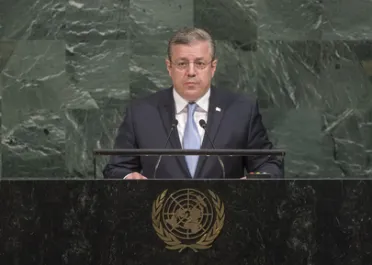Statement
Statement summary
GIORGI KVIRIKASHVILI, Prime Minister of Georgia, expressed condolences and sympathy to the victims of hurricanes in the Caribbean and the United States and earthquakes in Mexico, saying no country, including his, was immune from natural hazards. Recalling that 2017 marked the twenty-fifth anniversary of Georgia’s membership in the United Nations, he said his country had, during that period, gone from being a recipient of United Nations humanitarian assistance to becoming a top reformer and Chair of the Open Government Partnership. It supported the Secretary‑General’s proposed reforms for the Organization, he said.
He reviewed Georgia’s progress and commitment to democracy over the years, with its place in international rankings rising in such areas as fighting corruption, protection of property rights, an independent judiciary and law enforcement. “We are not making cosmetic changes,” he said, drawing attention to progressive initiatives contained in a new draft Constitution. Georgia aspired to become a full member of the European Union and the North Atlantic Treaty Organization (NATO), as it had long been an integral part of Europe’s broad cultural and historical tapestry.
Member States knew fully well the Russian Federation still occupied Abkhazia and Tskhinvali/South Ossetia in violation of its many international obligations, including dozens of Security Council and General Assembly resolutions, he said. In 2017, the Russian Federation had intensified its policy of occupation and factual annexation. It had implemented so-called “integration treaties” and signed so-called “agreements” with de facto authorities, absorbing the two regions into its military, political, economic and social systems. The Russian Federation had also intensified the fortification of occupation lines, installing razor wire fences, trenches and motion detectors, he added.
Georgia was committed to resolving the Russian Federation-Georgia conflict peacefully, with its Government complying with a European Union-mediated ceasefire agreement, he said. The Russian Federation, however, was not reciprocating. Georgia was grateful for United Nations support, including annual General Assembly resolutions on the right of return for internally displaced persons and refugees. However, he said, hundreds of thousands of compatriots still waited to return home because a Member State refused to comply with its international obligations. Georgia was determined to make the benefits of its European agenda available to people on the other side of the occupation line through a package of initiatives, including trade opportunities, health care, education and other social benefits, he said.
Full statement
Read the full statement, in PDF format.
Photo

Previous sessions
Access the statements from previous sessions.
